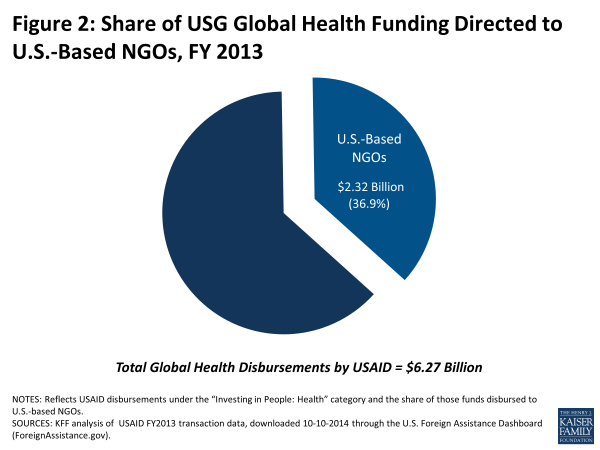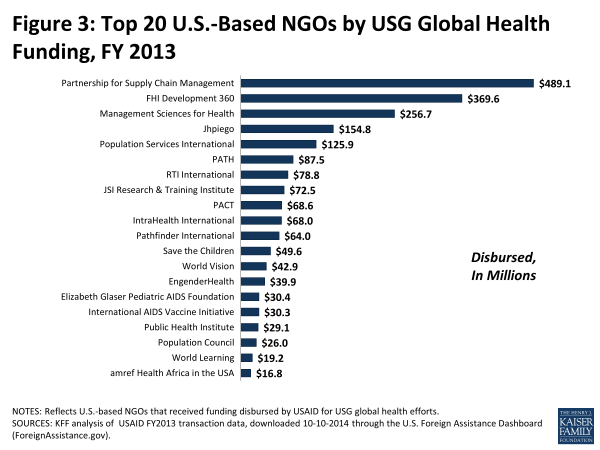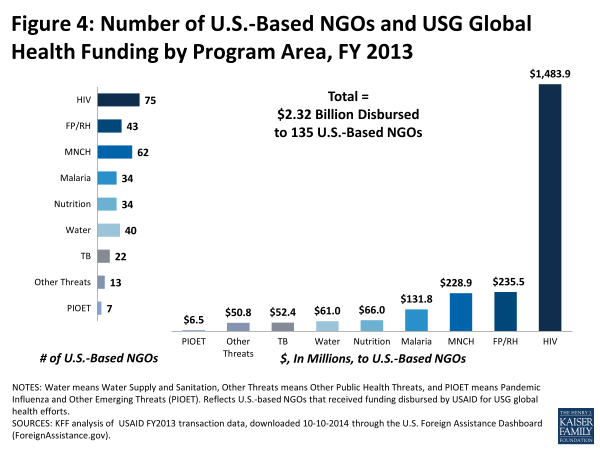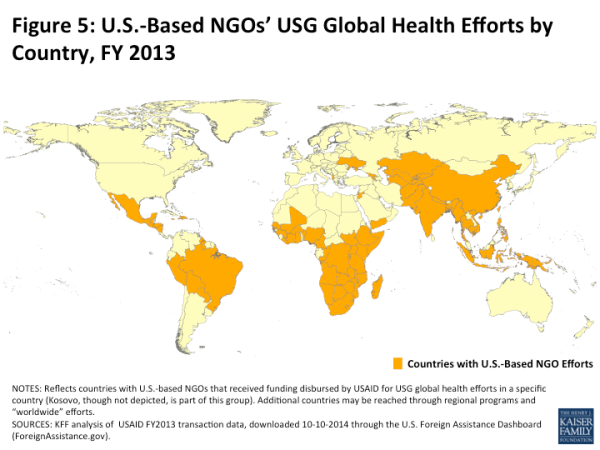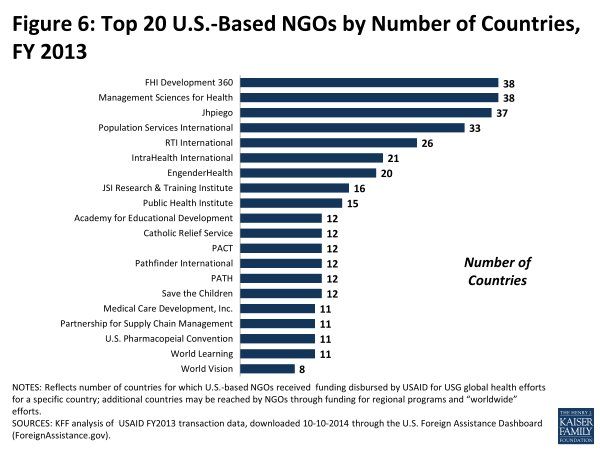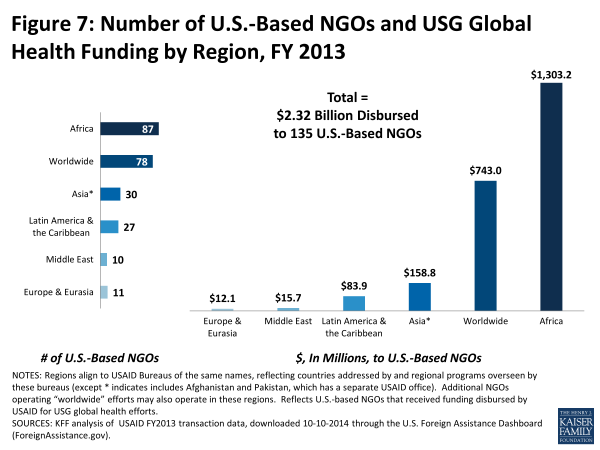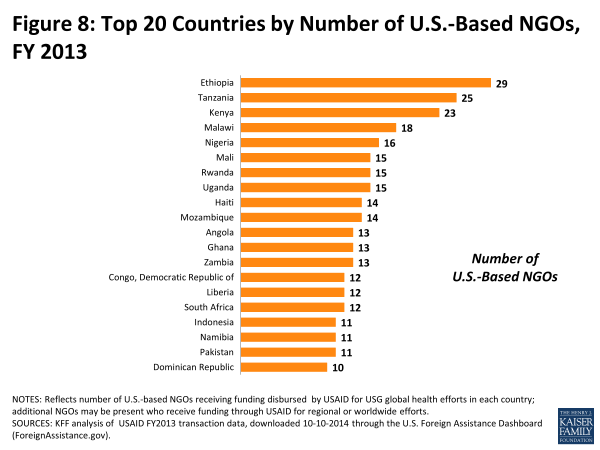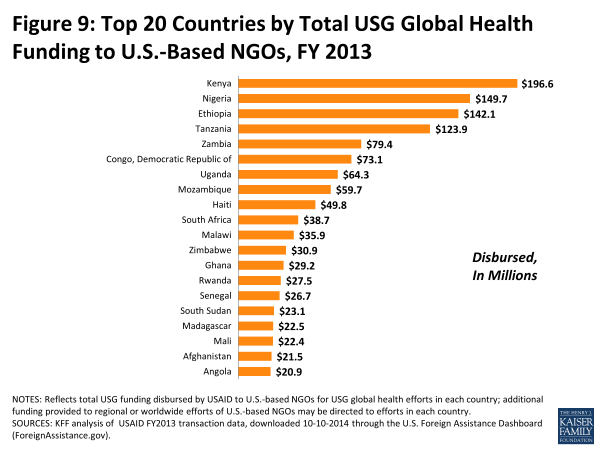NGO Engagement in U.S. Global Health Efforts: U.S.-Based NGOs Receiving USG Support Through USAID
Kellie Moss
Published:
Executive Summary
Non-governmental organizations (NGOs) are key partners in U.S. global health efforts. Indeed, a significant share of U.S. government funding for global health is channeled to NGOs, who act as program implementers on the ground. To date, however, little information has been available about the extent of their role in carrying out U.S. global health programs. To help fill this void, this report provides an analysis of U.S.-based NGOs that received global health funding from the U.S. government (USG) during FY 2013. It specifically focuses on funding provided to NGOs by the U.S. Agency for International Development (USAID), the largest implementer of global health activities among USG agencies and departments. The focus on USAID is due both to the availability of data from this agency and the fact that USAID spending represents the majority of bilateral U.S. global health spending.1 Key findings include (also see Table 1 below):
- Total Number of NGOs: In FY 2013, 135 U.S.-based NGOs received USG global health funding through USAID to implement global health activities. They include NGOs working on specific global health issues, those working in multiple health areas, as well as those with an even broader development scope. About 15% (20 NGOs) are faith-based organizations.
- Total Funding: Collectively, these NGOs received more than a third (approximately $2.32 billion) of USAID global health disbursements in FY 2013. The vast majority of this funding (91%) was concentrated among 20 NGOs. Funding amounts ranged from a high of more than $50 million per NGO (11 NGOs) to less than $1 million (74 NGOs).
- Program Areas: NGOs carry out global health efforts in all major U.S. program areas, with HIV receiving the highest amount of funding and involving the greatest number of NGOs. Family planning/reproductive health receives the second highest amount of funding, followed by maternal, newborn, and child health.
- Geographic Presence: NGOs received USG global health funding for efforts carried out in 72 countries and across multiple regions, including Africa, Asia, Europe & Eurasia, Latin America & the Caribbean, and the Middle East. Many NGOs (78) implement efforts that are “worldwide” in scope, though most (105) are engaged in regional and/or country-specific programs. Two-thirds of funding to NGOs ($1.57 billion) supports regional and country-specific efforts, while the remainder ($0.74 billion) is directed to “worldwide” efforts. Among the 103 engaged in country-specific efforts, the majority of NGOs (61) received funding for efforts in one country, while the remainder (42) received funding for efforts in two or more countries, including 19 that received funding in 10 or more countries. Nearly all countries (64 of 72) host activities by more than one NGO, with more than a quarter (20) – mostly in sub-Saharan Africa – hosting activities by 10 or more NGOs each. Overall, more NGOs operate in Africa than in all other regions combined.
| Table 1: Summary of U.S.-Based NGO Engagement in USG Global Health Efforts, FY 2013 | |
| # of NGOs | |
| 135 of which, 20 are faith-based organizations |
|
| USG Global Health Funding Provided by USAID | |
| $2,316,727,617 to U.S.-based NGOs |
|
| # of NGOs by Program Area | |
| HIV | 75 |
| Maternal, Newborn, and Child Health (MNCH) | 62 |
| Family Planning/Reproductive Health (FP/RH) | 43 |
| Water Supply and Sanitation | 40 |
| Malaria | 34 |
| Nutrition | 34 |
| Tuberculosis (TB) | 22 |
| Other Public Health Threats, including NTDs+2 | 13 |
| Pandemic Influenza and Other Emerging Threats (PIOET)3 | 7 |
| Countries Reached | |
| 72* | |
| NOTES: Reflects U.S.-based NGOs that received funding disbursed by USAID in FY 2013 for USG global health activities. + NTDs are neglected tropical diseases. * Other countries may have been reached through regional programs or “worldwide” efforts. SOURCES: KFF analysis of USAID FY2013 transaction data, downloaded 10-10-2014 through the U.S. Foreign Assistance Dashboard (ForeignAssistance.gov) as well as information from NGO websites. |
|
Report
Introduction
Non-governmental organizations (NGOs) are key partners in U.S. global health efforts. Indeed, a significant share of U.S. government funding for global health is channeled to NGOs, who act as program implementers on the ground. NGOs also play other roles in global health, including through advocacy, analysis, education and awareness-raising, and fundraising activities. To date, however, little information has been available about the extent of their role in carrying out U.S. global health programs.
To help fill this void, this report provides an analysis of U.S.-based NGOs that received global health funding from the U.S. government (USG) during FY 2013. Due to the parameters of the analysis as well as data limitations, this report focuses on USG funding that the U.S. Agency for International Development (USAID) received through direct appropriations as well as through interagency transfers (e.g., from the Department of State1), which together account for the majority of U.S. bilateral global health spending.2 Specifically, its findings are based on KFF analysis of data on funding disbursed by USAID in FY 2013 to U.S.-based non-profits implementing USG global health activities, which was downloaded from the U.S. government’s Foreign Assistance Dashboard (www.ForeignAssistance.gov); other sources of data included organizations’ websites, which were used to confirm organizations’ non-profit statuses as well as the U.S. locations of their headquarters/main U.S. offices implementing specific global health activities. (See Box 1 for the definition of U.S.-based NGOs utilized in the analysis and Appendix A for a detailed methodology.) In addition to identifying these NGOs, this report examines their funding levels, program areas, and geographic focus.
Box 1: Definition of Non-Governmental Organizations (NGOs)
For the purposes of this analysis, to be eligible to be included, an organization had to meet the following definition of a U.S.-based NGO: a non-profit that is independent of the U.S. government and any other government, based in the United States (through either its headquarters or a main U.S. office that had been awarded a USG global health project), and not a university/college, a hospital, or a foundation that solely supports a U.S. government department/agency, hospital, or university. Non-profits excluded under this definition include, for example, the CDC Foundation and the Pan American Health Organization. This definition was informed by the USAID definition of private voluntary organizations (PVOs),3 which guides a USAID registration process for NGOs.
By design, therefore, this report does not include an exhaustive examination of U.S.-based NGOs involved in carrying out USG-supported global health efforts (let alone U.S.-based NGOs carrying out global health efforts who do not receive USG support; see endnote4). It also does it include foreign-based NGOs, who also are significant implementers of USG programs.
Findings
Overview
More than 130 U.S.-based NGOs implement USG global health efforts. In FY 2013, 135 NGOs received USG funding from USAID to implement global health efforts (see Figure 1). They include NGOs working on specific global health issues (such as the Global Alliance for TB Drug Development and mWater), those working in multiple global health areas (such as CARE and Save the Children), and those with an even broader development scope (such as Innovations for Poverty Action). They include 20 faith-based NGOs (such as Samaritan’s Purse and World Vision).5
| Figure 1: U.S.-Based NGOs Implementing USG Global Health Efforts, FY 2013 | |||
|
|
|
|
| NOTES: Includes U.S.-based NGOs to which USAID disbursed USG global health funding in FY 2013. # indicates NGO is no longer operating. + indicates NGO included JSI Research & Training Institute, MSH, and AED. ~ indicates NGO is a separate legal entity established by JSI Research & Training Institute and MSH to implement specific work. SOURCES: KFF analysis of USAID FY2013 transaction data, downloaded 10-10-2014 through the U.S. Foreign Assistance Dashboard (ForeignAssistance.gov) as well as information from NGO websites. |
|||
Approximately $2.32 billion – or more than a third of USAID global health disbursements – was disbursed to U.S.-based NGOs in FY 2013. U.S.-based NGOs received $2,316,727,617 in FY 2013 for USG global health efforts, about 37% of total global health funding disbursed by USAID that year (see Figure 2). This funding was provided to U.S.-based NGOs through all of the functional and geographic bureaus at USAID, including the Bureau for Africa and the Bureau for Global Health.6
Most funding provided to NGOs was directed to a small number of organizations. Twenty NGOs accounted for the vast majority of funding (about 91% or $2.1 billion) (see Figure 3). Among these, 11 received more than more than $50 million in net disbursements each, collectively accounting for more than three-quarters of all funding (about 79% or $1.8 billion). These were the Partnership for Supply Chain Management, FHI Development 360, Management Sciences for Health (MSH), Jhpiego, Population Services International (PSI), PATH, RTI International, JSI Research & Training Institute, PACT, IntraHealth International, and Pathfinder International. On the other end of the funding range, 74 NGOs received less than $1 million each.
Program Areas
NGOs carry out USG global health efforts in all major U.S. program areas. NGOs are working in all nine program areas of the USG, including: HIV/AIDS; tuberculosis (TB); malaria; family planning/reproductive health (FP/RH); maternal, newborn, and child health (MNCH); nutrition; water supply and sanitation; pandemic influenza and other emerging threats (PIOET);7 and other public health threats, including neglected tropical diseases (NTDs).8
About half of NGOs receive funding in a single global health program area, while remaining NGOs receive funding to work in multiple program areas. In FY 2013, 68 NGOs received support for efforts related to a single program area, while 67 received support for efforts related to more than one program area, including 27 (20%) that received funding for efforts related to four or more areas.
The program area involving the greatest numbers of NGOs is HIV, followed by MNCH. As Figure 4 shows, 75 NGOs worked on HIV and 62 on MNCH efforts, followed by FP/RH (43), water supply and sanitation (40), malaria (34), nutrition (34), TB (22), and other public health threats (13). Only PIOET efforts involved less than ten NGOs, with 7 NGOs carrying out these efforts. The greatest proportion of funding to NGOs was for HIV efforts, followed by FP/RH and MNCH. (See Appendix B for a listing of NGOs by program area.)
Geographic Presence
Stateside, NGO operations are based across the U.S. but most often in the Northeast and West Coast regions. The headquarters/main U.S. offices of these NGOs are in half (25) of all U.S. states and in the District of Columbia (DC). The greatest number are in DC (25), followed by New York (21), Maryland (16), California (12), Virginia (10), Massachusetts (9), North Carolina (5), and Washington (4) — locations proximate to major USG, international, and multilateral organizations that address global health, universities with significant global health programs, and/or other major funders of global health efforts (e.g., the Gates Foundation, which is located in Washington state).
Worldwide Efforts
Nearly 80 NGOs provided “worldwide” support or focused on activities with global purposes. In FY 2013, 78 NGOs received funding for “worldwide” USG global health efforts; 30 received only “worldwide” funding, with the rest also receiving funding for country-and region-specific efforts. About a third of funding provided to NGOs ($0.74 billion) is directed to such efforts. “Worldwide” activities may include providing technical assistance to field missions as part of certain project awards and carrying out globally-focused activities; for example, in FY 2013, funds for worldwide efforts were disbursed for field support efforts related to fistula prevention and repair led by EngenderHealth and for vaccine research and development efforts carried out by the International AIDS Vaccine Initiative.
Regional and Country-Specific Efforts
More than 100 NGOs carried out regional and country-specific programs. In FY 2013, 105 NGOs received funding for regional and country-specific efforts, accounting for about two-thirds of funding provided to NGOs ($1.57 billion).
- Regional efforts: 22 NGOs received funding for activities that spanned portions and/or the entirety of one or more of the following regions: Africa, Asia, Eurasia, Latin American and the Caribbean, and the Middle East.9 Nearly all of these NGOs also received funding for “worldwide” efforts (19) as well as country-specific efforts (20).
- Country-specific efforts: More than three-quarters of NGOs (103) received funding for activities in a specific country, spanning 72 countries (see Figure 5).10 61 NGOs received such funding for efforts in one country, while 42 received funding for efforts in two or more countries. Among the 20 NGOs with the greatest number of country-specific efforts (see Figure 6), 19 carried out USG global health efforts in 10 or more countries.11 The efforts of four NGOs – FHI Development 360, MSH, Jhpiego, and PSI – each reached more than 30 countries.
Overall, more NGOs carry out regional and country-specific efforts in Africa than in all the other regions combined. As Figure 7 shows, nearly 90 U.S.-based NGOs received funding for region- and country-specific projects in Africa, with about a third as many (30) in Asia and fewer in other regions. Most regional/country funding was also directed to efforts in Africa, followed by Asia.
Nearly all countries host more than one NGO, with more than a quarter – mostly in sub-Saharan Africa – hosting 10 or more NGOs each. In FY 2013, the 72 countries reached by NGOs’ country-specific efforts each hosted activities by varying numbers of NGOs, with 8 countries hosting activities by one NGO apiece (i.e., 1 NGO received country-specific funding for efforts in each of 8 countries) and 64 countries hosting activities by more than one NGO apiece. About one in four countries (20) hosted activities by 10 or more U.S.-based NGOs implementing USG global health efforts (see Figure 8); most (16) of these countries are in sub-Saharan Africa. The number of NGOs was highest in Ethiopia (29), Tanzania (25), and Kenya (23); excluding these three countries, sub-Saharan African countries hosted an average of approximately nine NGOs each.
The countries with the highest levels of NGO funding are almost all in sub-Saharan Africa. In FY 2013, among the 20 countries with the highest country-specific funding to NGOs (see Figure 9), 18 are in sub-Saharan Africa. Funding to NGOs exceeded $50 million in each of 8 countries and was highest in Kenya ($196.6 million), followed by Nigeria ($149.7 million), and Ethiopia ($142.1 million). On the other end of the funding range, funding to NGOs was less than $1 million in each of 17 countries.
Conclusion
As the findings of this report have shown, U.S.-based NGOs play an important role in carrying out USG global health efforts, accounting for a third of USAID global health disbursements in FY 2013. Greater understanding of the extent of NGO engagement in these efforts can be elucidated by further analysis, as data on USG global health funding for U.S.-based NGOs become increasingly available publicly and as the quality and clarity of these data improve. The USG has taken important steps in recent years to make funding and project data more available and easily accessible, but further attention is still required to fill in gaps in data – particularly with regard to USG funding sources beyond USAID – and to ensure the quality and completeness of existing USG data resources. Moreover, such data are critical to evaluating whether investments in NGOs further achievement of USG global health goals. Still, the findings of this report suggest that the significant role of NGOs will be important to consider in understanding USG global health efforts going forward.
Appendices
Appendix A: Detailed Methodology
This report is based on Kaiser Family Foundation analysis of USAID global health funding data for FY 2013. Data were downloaded from the U.S. Foreign Assistance Dashboard (www.ForeignAssistance.gov) on October 10, 2014.
The analysis uses transaction-level data on funding disbursed by USAID to U.S.-based NGOs for global health activities. Data include funding that was appropriated by Congress to USAID for global health activities and then disbursed to NGOs, as well as funding that was appropriated to other agencies for global health efforts, transferred to USAID, and then disbursed to NGOs.1 Due to data limitations on the Dashboard and the parameters of this analysis, the data does not include funding disbursed by other USG departments/agencies (such as the Department of State or the Centers for Disease Control and Prevention) to NGOs. Still, this analysis captures the majority of bilateral U.S. global health funding disbursements.2
Additionally, note:
- To be eligible to be included in this analysis, an organization had to meet the following definition of a U.S.-based NGO: a non-profit that is independent of the U.S. government and any other government, based in the United States (through either its headquarters or a main U.S. office that had been awarded a USG global health project), and not a university/college, a hospital, or a foundation that solely supports a U.S. government department/agency, hospital, or university. Each organization’s non-profit status as well as whether they were U.S.-based was confirmed using data found on organizations’ websites.
- Funding totals shown in this report represent net disbursements, which include positive and negative disbursed funding amounts as well as zero-dollar disbursed funding amounts. For zero-dollar transactions, we included only transactions we could verify as no-cost extensions.3
Data on health funding provided under the American Schools and Hospitals Abroad (ASHA) program were not included in NGO funding totals but were included in the overall global health funding total ($6.27 billion).
Appendix B: U.S.-Based NGOs by Program Area, FY 2013
| Table B-1: U.S.-Based NGOs Implementing USG Global Health Efforts by Program Area, FY 2013 | |||
| Malaria 34 |
HIV 75 |
TB 22 |
|
|
|
|
|
| FP/RH 43 |
MNCH 62 |
Nutrition 34 |
|
|
|
|
|
| Other Public Health Threats, Including NTDs 13 |
Water Supply and Sanitation 40 |
Pandemic Influenza and Other Emerging Threats 7 |
|
|
|
|
|
| NOTES: Includes U.S.-based NGOs to which USAID disbursed USG global health funding, by program area, in FY 2013. SOURCES: KFF analysis of USAID FY2013 transaction data, downloaded 10-10-2014 through the U.S. Foreign Assistance Dashboard (ForeignAssistance.gov). |
|||
Endnotes
Executive Summary
Based on Kaiser Family Foundation analysis of data from the U.S. Foreign Assistance Dashboard (www.ForeignAssistance.gov).
Other Public Health Threats also addresses dangers posed by infectious diseases not included elsewhere, such as cholera, dengue, and meningitis; significant non-communicable health threats of major public health importance; the containment of antimicrobial resistance; and the crosscutting work on surveillance that builds capacity for outbreak preparedness and response. According to USAID congressional budget justifications, http://www.usaid.gov/results-and-data/budget-spending/congressional-budget-justification.
Pandemic Influenza and Other Emerging Threats includes efforts to mitigate the possibility that a highly virulent virus could develop into a pandemic by strengthening targeted countries’ ability to detect cases early and to apply appropriate control measures quickly. According to USAID congressional budget justifications, http://www.usaid.gov/results-and-data/budget-spending/congressional-budget-justification.
Report
For example, USAID transaction data analyzed for this report include funds transferred from the Department of State to USAID for HIV efforts, which were then obligated and eventually disbursed to U.S.-based NGOs.
Based on Kaiser Family Foundation analysis of data from the U.S. Foreign Assistance Dashboard (www.ForeignAssistance.gov).
PVOs are a subset of the wider NGO community and “are tax-exempt nonprofits that leverage their expertise and private funding to address development challenges abroad.” USAID, “PVO Registration,” webpage, http://www.usaid.gov/pvo.
Numerous U.S.-based NGOs carrying out global health efforts do not receive USG support for their efforts. For some, this is a conscious choice to not accept government funding, while others’ global health activities, priorities, and/or approaches may not lend themselves to being funded by the USG for any number of reasons. Some examples of U.S.-based NGOs engaged in global health activities that fall into this category include the Center for Health and Gender Equity (CHANGE), Doctors Without Borders/Médecins Sans Frontières (MSF) USA, Friends of the Global Fight Against AIDS, Tuberculosis and Malaria, the Mennonite Central Committee U.S., the ONE Campaign, and Oxfam America.
The 20 faith-based NGOs are Adventist Development and Relief Agency, Catholic Medical Missions Board, Catholic Relief Services, Cross International, Episcopal Relief & Development, Feed the Children, HOPE worldwide, International Orthodox Christian Charities, Lifewater International, Lutheran World Relief, Medical Teams International, Mennonite Economic Development Associates, Nazarene Compassionate Ministries, Samaritan's Purse, World Concern, World Hope International, World Relief, World Renew, World Vision, and YMCA. It is important to note, however, that other organizations may identify as secular but have religious principles undergirding their work. For example, the work of the Aga Khan Foundation (part of the Aga Khan Development Network, AKDN) “is underpinned by the ethical principles of Islam – particularly consultation, solidarity with those less fortunate, self-reliance and human dignity – but AKDN does not restrict its work to a particular community, country or region.” AKDN, “Press Centre: Frequent Questions,” webpage, http://www.akdn.org/faq.asp.
The other relevant bureaus are: the Bureau for Asia; Bureau for Europe and Eurasia; Bureau for Latin America and the Caribbean; Bureau for the Middle East; Office of Afghanistan and Pakistan Affairs; Bureau for Democracy, Conflict and Humanitarian Assistance; Bureau for Food Security; Bureau for Economic Growth, Education and Environment (previously known as the Bureau for Economic Growth and Trade (EGAT)); and U.S. Global Development Lab (incorporates the former Office of Innovation and Development Alliances (IDEA) and Office of Development Partners (ODP)). Additionally, a very small amount of funding was designated for the “Recovery” organizational unit.
Pandemic Influenza and Other Emerging Threats includes efforts to mitigate the possibility that a highly virulent virus could develop into a pandemic by strengthening targeted countries’ ability to detect cases early and to apply appropriate control measures quickly. According to USAID congressional budget justifications,http://www.usaid.gov/results-and-data/budget-spending/congressional-budget-justification.
Other Public Health Threats also addresses dangers posed by infectious diseases not included elsewhere, such as cholera, dengue, and meningitis; significant non-communicable health threats of major public health importance; the containment of antimicrobial resistance; and the crosscutting work on surveillance that builds capacity for outbreak preparedness and response. According to USAID congressional budget justifications,http://www.usaid.gov/results-and-data/budget-spending/congressional-budget-justification.
In addition to “worldwide” support, regions/sub-regions mentioned in the data sources included: Africa, East Africa, West Africa, South Africa, Asia, Central Asia, East Asia, Eurasia, the Middle East, Latin America & the Caribbean, Central America, and South America.
In addition to the countries listed below, other countries may have been reached through regional efforts. Afghanistan, Albania, Angola, Armenia, Bangladesh, Benin, Bolivia, Botswana, Brazil, Burkina Faso, Burma, Burundi, Cambodia, Cameroon, China, Congo (Republic of), Cote d'Ivoire, Djibouti, Dominican Republic, DR Congo, El Salvador, Ethiopia, Georgia, Ghana, Guatemala, Guinea, Guyana, Haiti, Honduras, India, Indonesia, Jamaica, Jordan, Kazakhstan, Kenya, Kosovo, Kyrgyzstan, Lesotho, Liberia, Madagascar, Malawi, Mali, Mexico, Mozambique, Namibia, Nepal, Nicaragua, Nigeria, Pakistan, Papua New Guinea, Paraguay, Peru, Philippines, Rwanda, Senegal, Somalia, South Africa, South Sudan*, Swaziland, Tajikistan, Tanzania, Thailand, Timor-Leste, Turkmenistan, Uganda, Ukraine, Uzbekistan, Vietnam, West Bank and Gaza, Yemen, Zambia, and Zimbabwe. *Some data entries state “Sudan, Pre-2011 Election”, which refers to the 2011 election that led to the division of Sudan into two countries, one of which is South Sudan; USG efforts have historically targeted this area.
Although a defunct organization whose activities were mostly taken over by FHI Development 360, the Academy for Education Development (AED) appears in FY 2013 transaction data and is, therefore, included in this analysis and the related figures.
Appendices
For example, USAID transaction data analyzed for this report include funds transferred from the Department of State to USAID for HIV efforts, which were then obligated and eventually disbursed to U.S.-based NGOs.
- Based on Kaiser Family Foundation analysis of data from the U.S. Foreign Assistance Dashboard (www.ForeignAssistance.gov).
Positive and negative disbursements along with zero-dollar disbursements that are no-cost extensions) are each closely linked to the recent completion or ongoing execution of global health activities, providing the best approximation available for showing where work is being done.

